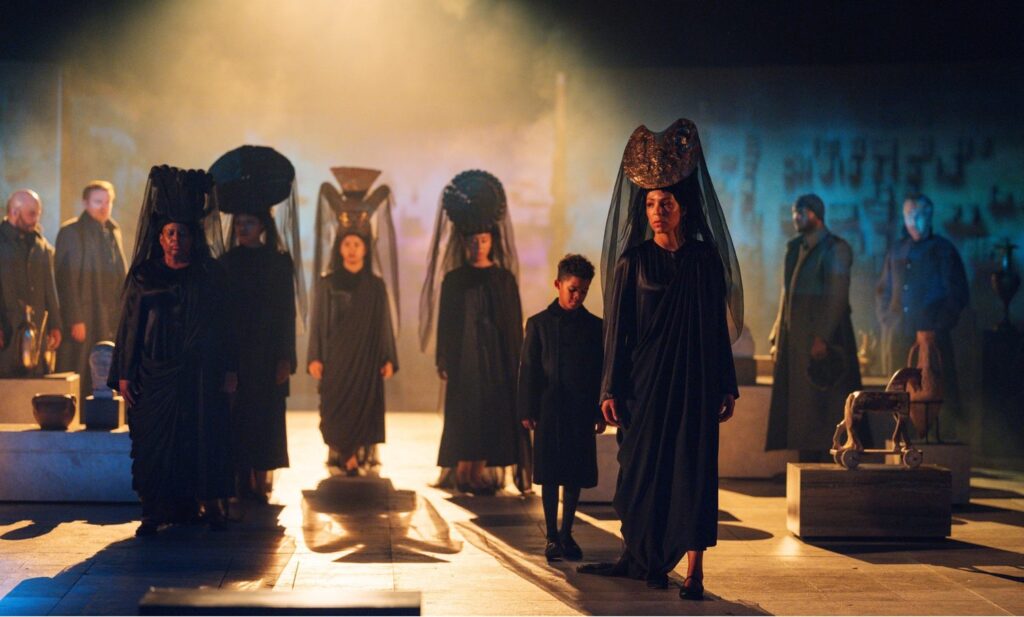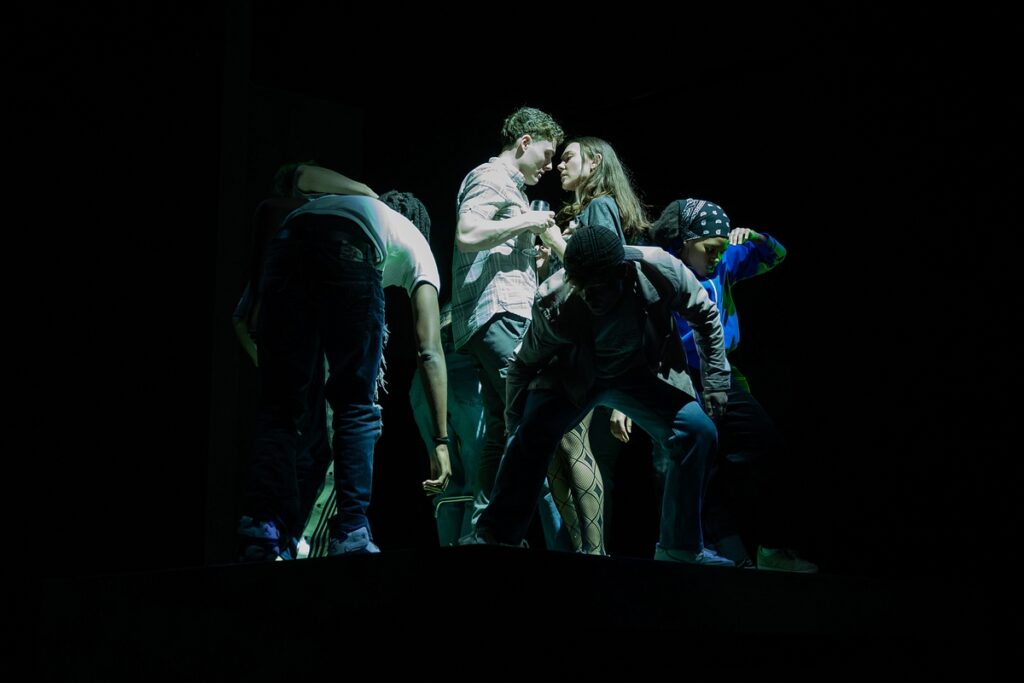
Coriolanus isn’t one of Shakespeare’s most popular plays. There have only been a handful of revivals in England during this century. There was the Tom Hiddleston-fronted production at the Donmar Warehouse in 2013 (though let’s be honest, its star was the attraction), two Royal Shakespeare Company runs, one of which transferred to London’s Old Vic, and a Globe Theatre production… and that’s it, besides Ralph Fiennes’s blood-soaked film adaptation in 2011.
Lyndsey Turner’s production on the Olivier theatre stage – with David Oyelowo taking on the warrior’s role – leans into the cinematic, yet is slicker than Fiennes’s gritty production; Es Devlin’s visually striking staging presents us with a museum-like world where objects could be part of the scene or a feature in an exhibition. A protester spraying a graffiti tag on The Capitoline Wolf – a bronze statue of Romulus and Remus being suckled by a she-wolf – could be a Just Stop Oil activist or a member of the plebs.
Therein lies the parallels that Turner draws between Coriolanus’s Rome and the modern day. The story of pompous elites and the patronised majority is a tale as old as time. She captures, too, the hypocrisy of those who rise from the lower classes towards power with the plebeian tribunes Brutus (an excellent Jordan Metcalfe) and Sicinius (Stephanie Street) bedecking themselves in custom tailoring as they hear the news of Coriolanus’s defection and imminent return.

Interestingly – or rather, oddly – the programme contains an essay from former Conservative politician Rory Stewart who draws the links between the US Presidential election and Coriolanus, a theme absent from Turner’s production. He does at least point to Corionalus’s inability to get his hands dirty – evident when he seeks his approval from the plebeian to become a consort.
Yet here Coriolanus’s mocking as he seeks their approval seems to come from boredom as much as being irritated by the plebeian, which goes against the later contempt and disgust he displays for them before his banishment. Still, his sense of being above them is clear, even if his desire to hide his wounds from their sight seems more embarrassment to acknowledge his scars than them being unworthy to view them.

There are some tonal oddities across the evening. Coriolanus’s denouncement of the Romans as he rages against them, declaring “I banish you,” is met by a notable scattering of laughter. Kemi-Bo Jacobs’s melodramatic Virgilia is detached from both the production and her husband. Coriolanus’s relationship with his mother, Volumnia (Pamela Nomvete), is almost as disconnected, so much so that her pleas to him at the play’s climax appear empty, and his relenting to them is hard to comprehend. Even the normally impressive Kobna Holdbrook-Smith finds his Aufidius at arm’s length from Coriolanus – the supposed rivalry seems entirely absent.
Despite the lack of emotional connections, Oyelowo somehow makes for an impressive Coriolanus. In exchanges with his peers, he holds himself straight-backed and carefully controlled. In battle, he is fierce: Turner and fight director Sam Lyon-Behan creating perhaps the most exhilarating fight scenes I have come across, played in part in slow-motion with flashes of blinding light (lighting designer Tim Lutkin) and amongst the blaring noise of battle (sound designer Tom Gibbons).
Memorable too is Annemarie Woods’ costume design with the women’s appearance in widow’s weeds before Coriolanus creating a chilling foreboding of what is to come as he prepares to storm Rome. But we don’t quite get what we expect – Coriolanus, having been bartered down to peace by his mother, meets an underwhelming end in this exhilarating but frustrating production.
Rating: ★★★☆☆ (Good)














